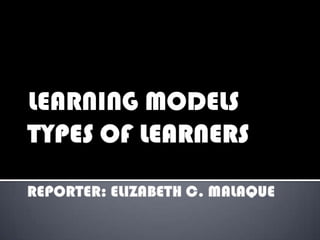Learning Models and Types of Learners
•Download as PPTX, PDF•
1 like•2,344 views
Report
Share
Report
Share

Recommended
Recommended
More Related Content
What's hot
What's hot (19)
CRITICAL THINKING AND REFLECTIVE PRACTICES-Unit 3-Teaching Strategies to help...

CRITICAL THINKING AND REFLECTIVE PRACTICES-Unit 3-Teaching Strategies to help...
CRITICAL THINKING AND REFLECTIVE PRACTICES-Unit 5-Reflective cycle-AIOU-8611

CRITICAL THINKING AND REFLECTIVE PRACTICES-Unit 5-Reflective cycle-AIOU-8611
Developmental Psychology And Learning , II Bimestre

Developmental Psychology And Learning , II Bimestre
Mini project 2-- teaching and learning theories spring 2015

Mini project 2-- teaching and learning theories spring 2015
Viewers also liked
Viewers also liked (9)
Similar to Learning Models and Types of Learners
Honey and Mumford learning stylesDo you know your preferred learning style?

Do you know your preferred learning style?Temitope Adelekan MBA, ITIL Expert, Prince2, COBIT 5,PMIIM
Similar to Learning Models and Types of Learners (20)
Collaborative Activities,HOTS Activities,Creative Learning.pdf

Collaborative Activities,HOTS Activities,Creative Learning.pdf
More from Divine Ampongol
More from Divine Ampongol (8)
Recently uploaded
This presentation was provided by William Mattingly of the Smithsonian Institution, during the fourth segment of the NISO training series "AI & Prompt Design." Session Four: Structured Data and Assistants, was held on April 25, 2024.Mattingly "AI & Prompt Design: Structured Data, Assistants, & RAG"

Mattingly "AI & Prompt Design: Structured Data, Assistants, & RAG"National Information Standards Organization (NISO)
APM Welcome
Tuesday 30 April 2024
APM North West Network Conference, Synergies Across Sectors
Presented by:
Professor Adam Boddison OBE, Chief Executive Officer, APM
Conference overview:
https://www.apm.org.uk/community/apm-north-west-branch-conference/
Content description:
APM welcome from CEO
The main conference objective was to promote the Project Management profession with interaction between project practitioners, APM Corporate members, current project management students, academia and all who have an interest in projects.APM Welcome, APM North West Network Conference, Synergies Across Sectors

APM Welcome, APM North West Network Conference, Synergies Across SectorsAssociation for Project Management
Recently uploaded (20)
Mattingly "AI & Prompt Design: Structured Data, Assistants, & RAG"

Mattingly "AI & Prompt Design: Structured Data, Assistants, & RAG"
Ecological Succession. ( ECOSYSTEM, B. Pharmacy, 1st Year, Sem-II, Environmen...

Ecological Succession. ( ECOSYSTEM, B. Pharmacy, 1st Year, Sem-II, Environmen...
Unit-IV; Professional Sales Representative (PSR).pptx

Unit-IV; Professional Sales Representative (PSR).pptx
Mixin Classes in Odoo 17 How to Extend Models Using Mixin Classes

Mixin Classes in Odoo 17 How to Extend Models Using Mixin Classes
Z Score,T Score, Percential Rank and Box Plot Graph

Z Score,T Score, Percential Rank and Box Plot Graph
APM Welcome, APM North West Network Conference, Synergies Across Sectors

APM Welcome, APM North West Network Conference, Synergies Across Sectors
This PowerPoint helps students to consider the concept of infinity.

This PowerPoint helps students to consider the concept of infinity.
Presentation by Andreas Schleicher Tackling the School Absenteeism Crisis 30 ...

Presentation by Andreas Schleicher Tackling the School Absenteeism Crisis 30 ...
Learning Models and Types of Learners
- 4. This matrix provides a learning cycle that involves four processes that must be present for learning to occur. Kolb called this Experiential Learning since experience is the source of learning and development (1984). Each ends of the continuums (modes) provide a step in the learning process:
- 5. Concrete experience (feeling): Learning from specific experiences and relating to people. Sensitive to other's feelings. Reflective observation (watching): Observing before making a judgment by viewing the environment from different perspectives. Looks for the meaning of things. Abstract conceptualization (thinking): Logical analysis of ideas and acting on intellectual understanding of a situation. Active experimentation (doing): Ability to get things done by influencing people and events through action. Includes risk-taking. Depending upon the situation or environment, the learners may enter the learning cycle at any point and will best learn the new task if they practice all four modes.
- 7. Enjoys new experiences and challenges. Thrives best in situations which involve changing range of activities. Enjoys being the center of attention Benefits from the opportunity to develop ideas through discussion and interaction with others Likely to learn most effectively through group work, discussions, seminars, workshops, etc.
- 8. Dislikes taking a passive role in learning and does not enjoy tightly constrained tasks. Prefers to work with others. Learns least effectively from the lectures, labs, reading writing on own
- 9. Enjoy seeing how theory relates to practice. Enjoys practical techniques relevant to subject/Employment and practical problem solving. Prefers practical rather than theoretical and likes clear guidelines to work to. Learns most effectively through work based projects, practical problem solving etc.
- 10. Dislikes learning situations where material too theoretically based and where the practical application or relevance cannot be seen. Learns least effectively from theoretical discussion, debate, etc.
- 11. Likes the opportunity to think and mull over applications Prefers to take back seat in discussions. Learns from listening, observing and working independently Learns most effectively through individual project work, lectures and independent study Dislikes being forced to contribute to discussion without considering all evidence and being rushed from one activity to another.
- 12. Learns most effectively when dealing with models and theories and likes a clear and definite purpose for work. Enjoys exploring connections between ideas, issues and concepts. Learns most effectively through problem solving, discussion and questioning theory, or reading and evaluating books. Dislikes being involved in unstructured situations with no obvious theoretical framework
- 13. Likely to be more comfortable with objective facts Learns least effectively from open-ended questions, explorative project work, skills training etc.
